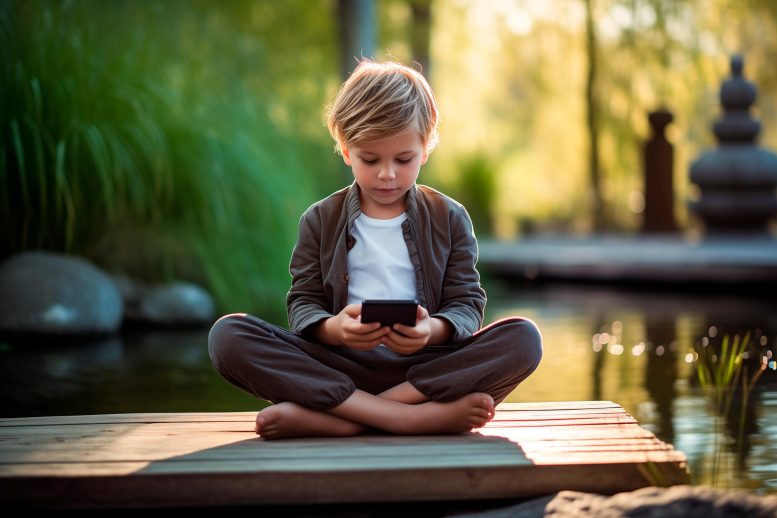
Analysis from MIT underscores the advantages of mindfulness for youngsters, particularly through the COVID-19 pandemic. Whereas school-based mindfulness packages have proven optimistic outcomes in consideration and psychological well being, the pandemic prompted a shift in direction of app-based mindfulness options. The research found that kids utilizing a mindfulness app for 40 days noticed psychological well being enhancements. Furthermore, these app-based packages may probably cater to a wider viewers, offering them with flexibility and scalability advantages.
New analysis suggests each day mindfulness coaching at dwelling helped scale back children’ stress ranges and adverse feelings.
MIT researchers report that kids who used a mindfulness app at dwelling for 40 days confirmed enhancements in a number of elements of psychological well being, together with reductions in stress and adverse feelings reminiscent of loneliness and concern.
Advantages of Mindfulness for Kids
Many research have discovered that practising mindfulness — outlined as cultivating an open-minded consideration to the current second — has advantages for youngsters. Kids who obtain mindfulness coaching at college have demonstrated enhancements in consideration and habits, in addition to larger psychological well being.
When the COVID-19 pandemic started in 2020, sending thousands and thousands of scholars dwelling from faculty, a bunch of MIT researchers questioned if distant, app-based mindfulness practices may provide comparable advantages. In a research performed throughout 2020 and 2021, they report that kids who used a mindfulness app at dwelling for 40 days confirmed enhancements in a number of elements of psychological well being, together with reductions in stress and adverse feelings reminiscent of loneliness and concern.
The findings recommend that distant, app-based mindfulness interventions, which may probably attain a bigger variety of kids than school-based approaches, may provide psychological well being advantages, the researchers say.
Supporting Analysis on Mindfulness
“There may be rising and compelling scientific proof that mindfulness can help psychological well-being and promote psychological well being in numerous kids and adults,” says John Gabrieli, the Grover Hermann Professor of Well being Sciences and Know-how, a professor of mind and cognitive sciences at MIT, and the senior creator of the research, which seems this week within the journal Mindfulness.
Researchers in Gabrieli’s lab additionally not too long ago reported that kids who confirmed larger ranges of mindfulness have been extra emotionally resilient to the adverse impacts of the COVID-19 pandemic.
“To some extent, the affect of Covid is out of your management as a person, however your means to reply to it and to interpret it could be one thing that mindfulness might help with,” says MIT graduate scholar Isaac Treves, who’s the lead creator of each research.
Pandemic Resilience
After the pandemic started in early 2020, Gabrieli’s lab determined to analyze the consequences of mindfulness on kids who needed to go away faculty and isolate from buddies. In a research that appeared within the journal PLOS One in July, the researchers explored whether or not mindfulness may increase kids’s resilience to adverse feelings that the pandemic generated, reminiscent of frustration and loneliness.
Working with college students between 8 and 10 years previous, the researchers measured the kids’s mindfulness utilizing a standardized evaluation that captures their tendency guilty themselves, ruminate on adverse ideas, and suppress their emotions.
The researchers additionally requested the kids questions on how a lot the pandemic had affected totally different elements of their lives, in addition to questions designed to evaluate their ranges of tension, despair, stress, and adverse feelings reminiscent of fear or concern.
Amongst kids who confirmed the very best ranges of mindfulness, there was no correlation between how a lot the pandemic impacted them and adverse emotions. Nevertheless, in kids with decrease ranges of mindfulness, there was a robust correlation between Covid-19 affect and adverse feelings.
The kids on this research didn’t obtain any form of mindfulness coaching, so their responses mirror their tendency to be aware on the time they answered the researchers’ questions. The findings recommend that kids with larger ranges of mindfulness have been much less prone to get caught up in adverse feelings or blame themselves for the adverse issues they skilled through the pandemic.
“This paper was our greatest try to take a look at mindfulness particularly within the context of Covid and to consider what are the elements that will assist kids adapt to the altering circumstances,” Treves says. “The takeaway just isn’t that we shouldn’t fear about pandemics as a result of we are able to simply assist the children with mindfulness. Persons are capable of be resilient once they’re in programs that help them, and in households that help them.”
Distant Interventions
The researchers then constructed on that research by exploring whether or not a distant, app-based intervention may successfully improve mindfulness and enhance psychological well being. Researchers in Gabrieli’s lab have beforehand proven that college students who acquired mindfulness coaching in center faculty confirmed higher educational efficiency, acquired fewer suspensions, and reported much less stress than those that didn’t obtain the coaching.
For the brand new research, reported immediately in Mindfulness, the researchers labored with the identical kids that they had recruited for the PLOS One research and divided them into three teams of about 80 college students every.
One group acquired mindfulness coaching by an app created by Inside Explorer, a nonprofit that additionally develops school-based meditation packages. These kids have been instructed to interact in mindfulness coaching 5 days every week, together with rest workouts, respiratory workouts, and different types of meditation.
For comparability functions, the opposite two teams have been requested to make use of an app for listening to audiobooks (not associated to mindfulness). One group was merely given the audiobook app and inspired to pay attention at their very own tempo, whereas the opposite group additionally had weekly one-on-one digital conferences with a facilitator.
At the start and finish of the research, the researchers evaluated every participant’s ranges of mindfulness, together with measures of psychological well being reminiscent of anxiousness, stress, and despair. They discovered that in all three teams, psychological well being improved over the course of the eight-week research, and every group additionally confirmed will increase in mindfulness and prosociality (participating in useful habits).
Moreover, kids within the mindfulness group confirmed some enhancements that the opposite teams didn’t, together with a extra vital lower in stress. In addition they discovered that oldsters within the mindfulness group reported that their kids skilled extra vital decreases in adverse feelings reminiscent of anger and unhappiness. College students who practiced the mindfulness workouts essentially the most days confirmed the best advantages.
The researchers have been shocked to see that there have been no vital variations in measures of tension and despair between the mindfulness group and audiobook teams; they hypothesize which may be as a result of college students who interacted with a facilitator in one of many audiobook teams additionally skilled useful results on their psychological well being.
General, the findings recommend that there’s worth in distant, app-based mindfulness coaching, particularly if kids have interaction with the workouts persistently and obtain encouragement from dad and mom, the researchers say. Apps additionally provide the flexibility to succeed in a bigger variety of kids than school-based packages, which require extra coaching and sources.
“There are loads of nice methods to include mindfulness coaching into colleges, however basically, it’s extra resource-intensive than having folks obtain an app. So, when it comes to pure scalability and cost-effectiveness, apps are helpful,” Treves says. “One other advantage of apps is that the children can go at their very own tempo and repeat practices that they like, so there’s extra freedom of alternative.”
References:
“At-Dwelling use of App-Based mostly Mindfulness for Kids: A Randomized Lively-Managed Trial” by Isaac N. Treves, Halie A. Olson, Ola Ozernov-Palchik, Cindy E. Li, Kimberly L. Wang, Xochitl M. Arechiga, Simon B. Goldberg and John D. E. Gabrieli, 9 October 2023, Mindfulness.
DOI: 10.1007/s12671-023-02231-3
“Mindfulness helps emotional resilience in kids through the COVID-19 pandemic” by Isaac N. Treves, Cindy E. Li, Kimberly L. Wang, Ola Ozernov-Palchik, Halie A. Olson and John D. E. Gabrieli, 12 July 2023, PLOS ONE.
DOI: 10.1371/journal.pone.0278501
The analysis was funded by the Chan Zuckerberg Initiative as a part of the Attain Each Reader Undertaking, the Nationwide Institutes of Well being, and the Nationwide Science Basis.

